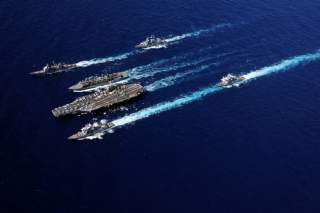Don't Just Rename the Pacific Command—Give It More Weapons
Rebranding the Pacific Command represents an effort to recast how military folk assigned to the command regard their theater and how to manage it.
And on and on. Mental maps can distort cost/benefit calculations, and thus foreign policy and strategy. If a society places excess importance on an ocean or sea, or on some contested terrestrial feature, it’s apt to expend significant resources to manage events there—regardless of whether its interests warrant a lavish expenditure. Like the Ninth Avenue Manhattanites parodied in the New Yorker, officials and rank-and-file citizens may attach outsized importance to a particular seaway or parcel of land. If so they deprecate the importance of other features—perhaps to the detriment of clear-eyed strategic analysis.
And lastly, no single, all-encompassing mental map governs how people, institutions, or governments think or act. Professor Henrikson maintains that individuals picture their surroundings through a variety of geographical images rippling outward from the immediate vicinity to encompass the globe as a whole. “Smaller mental maps may be conceived of as being embedded, ‘hierarchically,’ within ever larger ones . . . . That is to say, a mental map of one’s locality fits into that of one’s region, which in turn fits within that for comprehending global relations.”
That’s a fitting analysis coming from a professor whose home institution prides itself on instilling a global perspective in graduates. And it does comport with reality in many cases. Writing some years ago, for instance, Indian commentator C. Raja Mohan observed that Indians think in concentric circles: one mental map centers on the subcontinent, the next enfolds the Indian Ocean region as a whole, and the largest sweeps the planet.
But is that always true? The global needn’t trump the regional and the regional needn’t trump the local—right? The local map might predominate for some individuals or groups, and local affinities might predominate with it. Aristotle, a philosopher of some small renown, regarded the city-state as the basic political unit because he prized self-sufficiency and the city-state was the smallest self-sufficient community. “Greece” was a geographic construct that barely registered with citizens of Greek city-states that warred constantly against one another.
Or think about Robert E. Lee. The state of Virginia clearly took precedence over the Union on Robert E. Lee’s mental map of North America, and commanded his fealty. Otherwise General Lee would never have resigned his U.S. Army commission to command the Confederate Army. “Save in the defense of my native State, I never desire again to draw my sword,” he informed Gen. Winfield Scott when tendering his resignation in April 1861. Yet he drew the sword—and he did so because he placed state before national allegiance. For Lee, it seems, Henrikson’s geographic hierarchy was inverted. Marse Robert thought nationally but acted locally.
By renaming the U.S. Pacific Command, though, the Pentagon is putting Americans, allies and friends, and antagonists on notice that Henrikson’s concept of hierarchy indeed prevails in U.S. strategic thinking. The Pentagon’s mental map of the Indo-Pacific supersedes subregional mental maps.
So what? Let’s close with some insight from Henry Kissinger, who once wrote that deterrence is a product of our capabilities, our resolve to use our capabilities under certain well-defined circumstances, and an antagonist’s belief in our resolve to use capabilities to carry out our deterrent threats. We deter when we make prospective foes believers. The same logic goes for heartening allies. If Asian friends know Washington will keep its commitments to them, then they will be likelier to hold fast in times of trial. And if they hold fast, then America will solidify its strategic position along the eastern and southern rimlands. In turn, allies will draw new confidence from the U.S. forward presence—and a virtuous cycle will have been set in motion.
The United States and its allies will not prevail solely through linguistic gamesmanship. It’s far from obvious that Washington intends to assign the newly christened Indo-Pacific Command additional capabilities in the form of ships, aircraft, warmaking implements of all types—backing its strategic messaging with steel. Nothing good comes of a mismatch between purpose and power. But renaming the command does signal the willpower to deploy U.S. capabilities to fulfill commitments to allies and friends in East and South Asia—and to stymie those, such as China and Russia, that wish above all things to usher the United States out of the region. Combine physical might with moxie and the prospects for deterrence brighten.
A modest step? Indubitably—but revising mental maps constitutes a step in the right direction. More, please.
James Holmes is J. C. Wylie Chair of Maritime Strategy at the Naval War College and coauthor of Red Star over the Pacific (second edition forthcoming this fall). The views voiced here are his alone.

